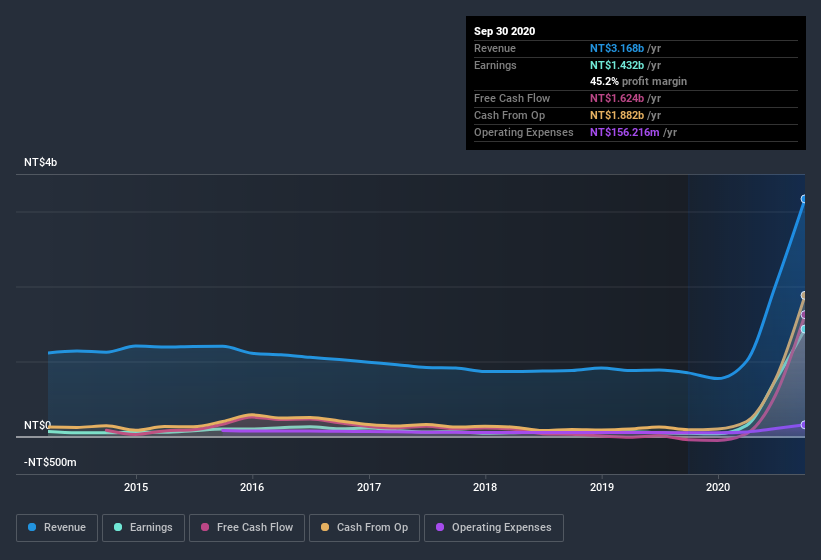Universal Incorporation's (TPE:1325) Earnings Are Growing But Is There More To The Story?

Broadly speaking, profitable businesses are less risky than unprofitable ones. However, sometimes companies receive a one-off boost (or reduction) to their profit, and it's not always clear whether statutory profits are a good guide, going forward. This article will consider whether Universal Incorporation's (TPE:1325) statutory profits are a good guide to its underlying earnings.
We like the fact that Universal Incorporation made a profit of NT$1.43b on its revenue of NT$3.17b, in the last year. Happily, it has grown both its profit and revenue over the last three years, as you can see in the chart below.
View our latest analysis for Universal Incorporation

Not all profits are equal, and we can learn more about the nature of a company's past profitability by diving deeper into the financial statements. Today, we'll discuss Universal Incorporation's free cashflow relative to its earnings, and consider what that tells us about the company. Note: we always recommend investors check balance sheet strength. Click here to be taken to our balance sheet analysis of Universal Incorporation.
Examining Cashflow Against Universal Incorporation's Earnings
Many investors haven't heard of the accrual ratio from cashflow, but it is actually a useful measure of how well a company's profit is backed up by free cash flow (FCF) during a given period. In plain english, this ratio subtracts FCF from net profit, and divides that number by the company's average operating assets over that period. The ratio shows us how much a company's profit exceeds its FCF.
That means a negative accrual ratio is a good thing, because it shows that the company is bringing in more free cash flow than its profit would suggest. While having an accrual ratio above zero is of little concern, we do think it's worth noting when a company has a relatively high accrual ratio. That's because some academic studies have suggested that high accruals ratios tend to lead to lower profit or less profit growth.
Universal Incorporation has an accrual ratio of -0.18 for the year to September 2020. That implies it has very good cash conversion, and that its earnings in the last year actually significantly understate its free cash flow. To wit, it produced free cash flow of NT$1.6b during the period, dwarfing its reported profit of NT$1.43b. Given that Universal Incorporation had negative free cash flow in the prior corresponding period, the trailing twelve month resul of NT$1.6b would seem to be a step in the right direction.
Our Take On Universal Incorporation's Profit Performance
Happily for shareholders, Universal Incorporation produced plenty of free cash flow to back up its statutory profit numbers. Because of this, we think Universal Incorporation's underlying earnings potential is as good as, or possibly even better, than the statutory profit makes it seem! And on top of that, its earnings per share have grown at an extremely impressive rate over the last three years. At the end of the day, it's essential to consider more than just the factors above, if you want to understand the company properly. If you want to do dive deeper into Universal Incorporation, you'd also look into what risks it is currently facing. For example - Universal Incorporation has 1 warning sign we think you should be aware of.
This note has only looked at a single factor that sheds light on the nature of Universal Incorporation's profit. But there are plenty of other ways to inform your opinion of a company. For example, many people consider a high return on equity as an indication of favorable business economics, while others like to 'follow the money' and search out stocks that insiders are buying. While it might take a little research on your behalf, you may find this free collection of companies boasting high return on equity, or this list of stocks that insiders are buying to be useful.
If you decide to trade Universal Incorporation, use the lowest-cost* platform that is rated #1 Overall by Barron’s, Interactive Brokers. Trade stocks, options, futures, forex, bonds and funds on 135 markets, all from a single integrated account. Promoted
If you're looking to trade Universal Incorporation, open an account with the lowest-cost platform trusted by professionals, Interactive Brokers.
With clients in over 200 countries and territories, and access to 160 markets, IBKR lets you trade stocks, options, futures, forex, bonds and funds from a single integrated account.
Enjoy no hidden fees, no account minimums, and FX conversion rates as low as 0.03%, far better than what most brokers offer.
Sponsored ContentNew: AI Stock Screener & Alerts
Our new AI Stock Screener scans the market every day to uncover opportunities.
• Dividend Powerhouses (3%+ Yield)
• Undervalued Small Caps with Insider Buying
• High growth Tech and AI Companies
Or build your own from over 50 metrics.
This article by Simply Wall St is general in nature. It does not constitute a recommendation to buy or sell any stock, and does not take account of your objectives, or your financial situation. We aim to bring you long-term focused analysis driven by fundamental data. Note that our analysis may not factor in the latest price-sensitive company announcements or qualitative material. Simply Wall St has no position in any stocks mentioned.
*Interactive Brokers Rated Lowest Cost Broker by StockBrokers.com Annual Online Review 2020
Have feedback on this article? Concerned about the content? Get in touch with us directly. Alternatively, email editorial-team (at) simplywallst.com.
About TWSE:1325
Universal Incorporation
Manufactures and sells nonwoven fabrics in the United States, Asia, and Europe.
Flawless balance sheet very low.
Similar Companies
Market Insights
Community Narratives



